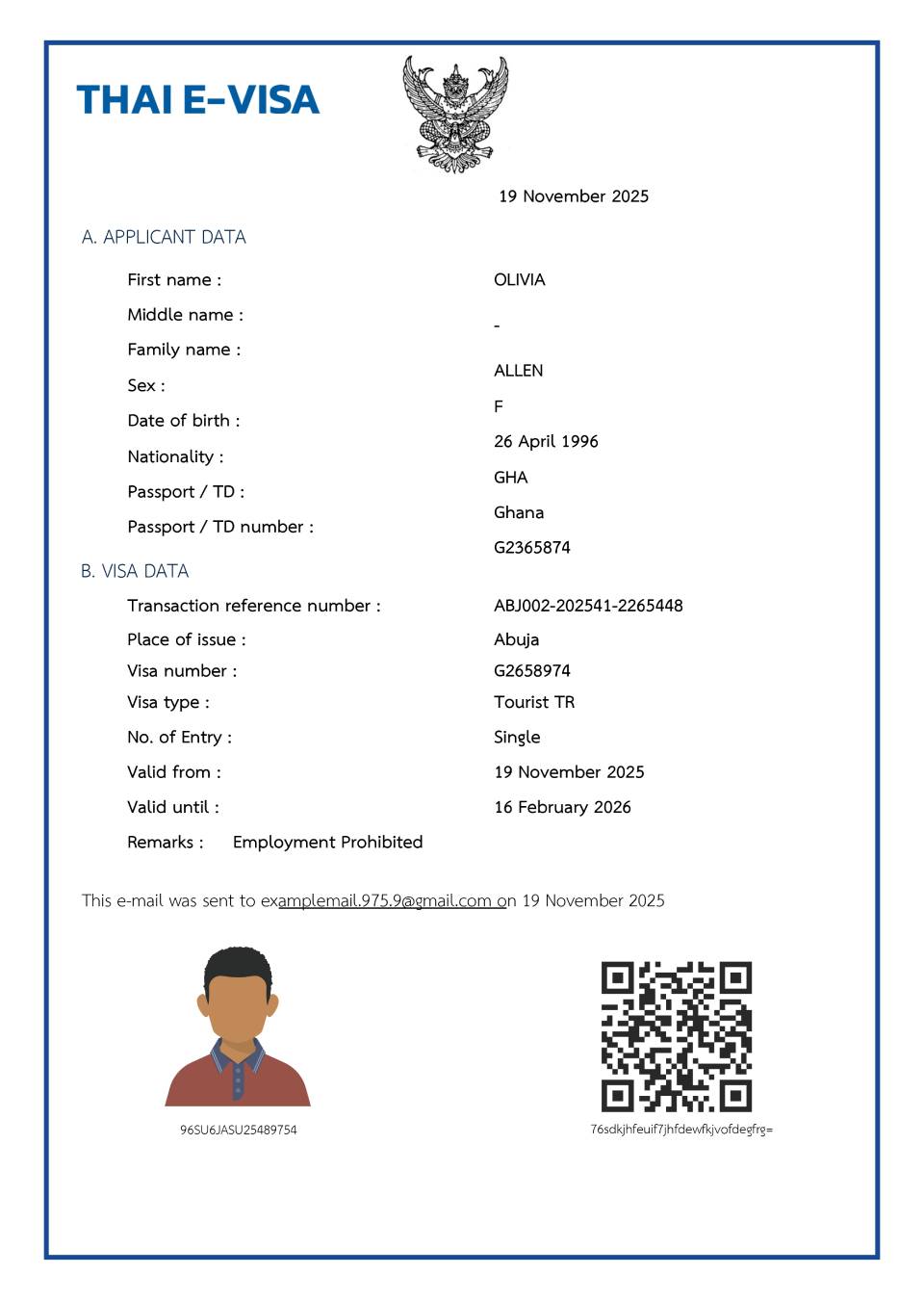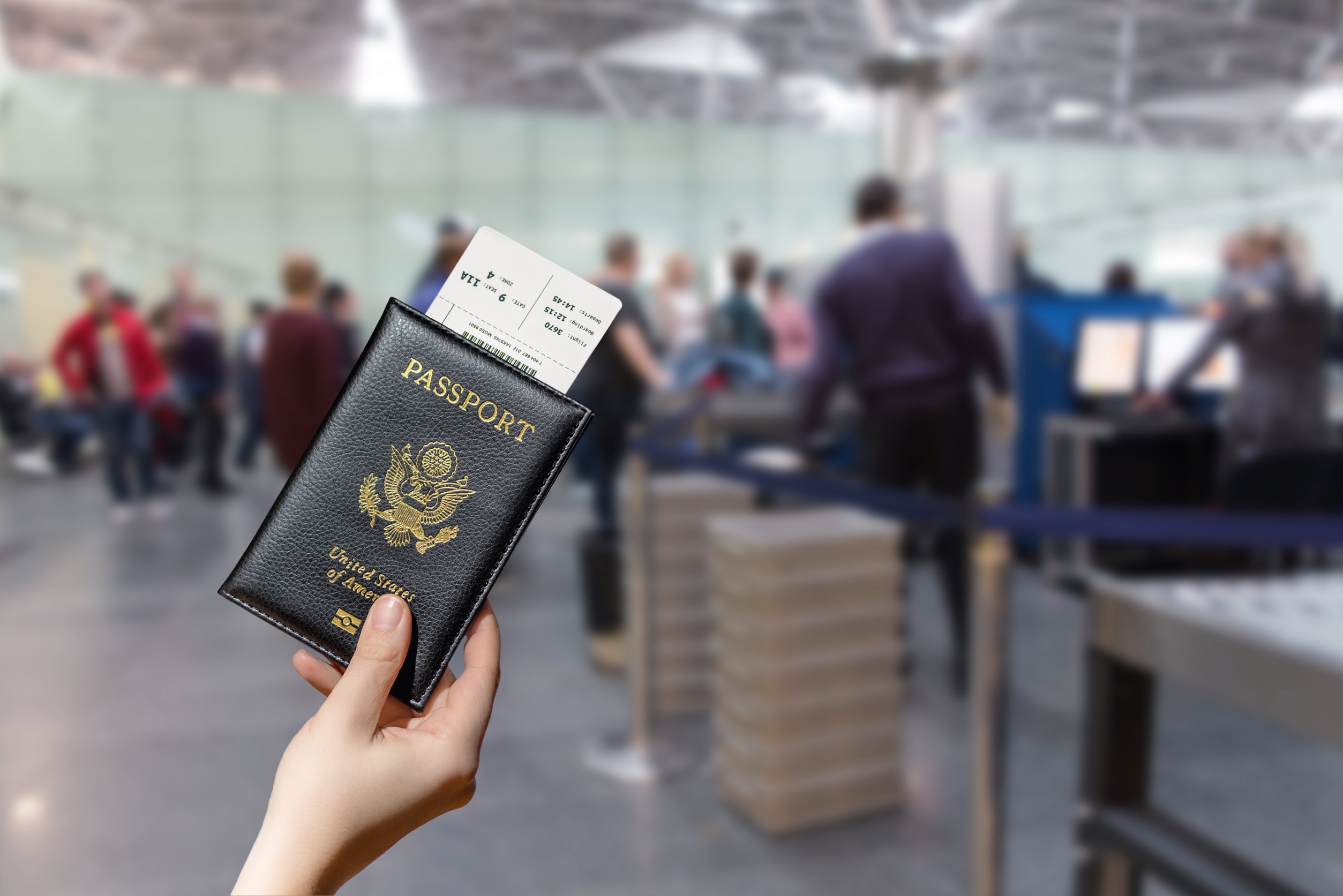Thailand Electronic Visa – Sample

Thailand is a Southeast Asian country famed for its ancient ruins, water canals, floating water markets, sandy beaches, numerous temples and contemporary cityscapes. In 2018, it greeted a record 38.27 million tourists from the world, many of them were most likely here on a Thai Tourist Visa.
This article will go through the application procedure for a Thailand visa and the many types of Thailand visas, requirements, and other commonly asked topics. Foreigners visiting Thailand may need to apply for a Thailand visa beforehand.

There are a number of visas available for those travelling to Thailand, depending on the visit's purpose and duration of stay. The most common visa types include tourist, Non-Immigrant Visas, transit, and Diplomatic/official.
Thailand Elite Visa is a long-term visa that falls under the Privilege Entry Visa category. In exchange for a membership fee, it grants residents of Thailand residency and perks ranging from 5 to 20 years, depending on their selected package. The Elite Visa is multiple entrances, a 5-year renewable visa with an optional one-year
This is a multiple-entry or single-entry 60-day tourist visa for Thailand that a visa run can extend for an additional 30 days. You can change the visa to a non-immigrant visa if you wish to prolong it beyond 30 days, but you'll have to travel to a neighbouring city or nation.
Typically, this is a single-entry visa for Thailand with a 90-day validity period. You can extend your stay by performing a visa run to the border or a neighbouring city/country, just like with the tourist visa. It is feasible to create a bank account and get a work permit.
This visa is frequently a multiple-entry visa to Thailand, which is good for one year. You are permitted to stay for 90 days at each entrance; thus, you must visit the border every 90 days to have your visa stamped there (visa run).
This visa is intended for those wishing to do legitimate business in Thailand. The term "Non-Immigrant Business Visa" is also used. You can apply for a work permit and open a bank account, but you must still run your visa every 90 days.
You must have spent three consecutive months in Thailand with one-year visa extensions in order to be eligible for this visa. You must make 30,000 Baht per month if you have been married to a Thai for five years. You must complete at least 80,000 Baht each month if you are single. To get eligible for a Permanent Resident Visa in Thailand, you only need to produce your three years' worth of personal tax returns demonstrating your ability to meet the aforementioned income standards.

In order to apply for a Thai visa, travellers must provide various documents as part of their application. These typically include passport photographs, valid passports or travel documents good for at least six months after arrival date in Thailand, proof of sufficient funds to support oneself during the stay in Thailand (such as bank statements), evidence that the applicant will be leaving Thailand before the expiration date stated on the visa (such as return airline tickets), and any other documentation requested by the Thai Embassy or Consulate.
Following are the general documents required for a variety of different visas:
Note: For visas allowing multiple entries, the letter must specify the dates of at least two visits to Thailand, both arrival and departure.
Thailand Electronic Visa – Sample

If you are a foreign national who meets the requirements for a Thailand visa on arrival, you will require the following paperwork:
You require the following supplementary papers to enrol in a school in Thailand:
If your programme lasts more than a year: Police Certificate signed by a Notary Public and issued by the police department in your nation of citizenship.
The following extra paperwork is required if you're applying for a Thailand Marriage Visa:
You need the following extra documentation if you visit Thailand for tourism:
If you're requesting a visa with numerous entries:
Anyone not exempt from the need for a visa or not qualified to obtain one upon arrival must apply for a Thai visa at one of Thailand's diplomatic missions overseas, such as an embassy or consulate. The following is the application procedure for a Thai visa:
The cost and process for obtaining a Thai visa type varies depending on the type of visa requested. Thailand Tourist Visas are generally the least expensive, while Non-Immigrant Visas may require additional Thailand visa fees such as processing and handling costs. Additionally, transit visas have a different fee structure than other types of visas, while diplomatic/official visas may be free depending on the individual's circumstances. It is important to note that all fees must be paid prior to applying for your Thailand visa.
By understanding these types of visas available and being aware of the required documentation, visitors can ensure their application is complete and submit it in an efficient manner. With this knowledge in hand, travellers can more easily obtain the necessary Thai visa and start planning their trip to Thailand.
The type of Thailand visa you need depends on the purpose and duration of your stay in the country. For short-term visits (up to 30 days), such as business trips or holiday visits, you may be eligible for a Non-Immigrant Visa. If you plan to stay longer or are interested in staying permanently, you may need to apply for a longer-term visa, such as an Immigrant Visa.
The process of applying for Thailand visa can vary depending on the type of visa and where you are using from. Generally speaking, you will need to submit documents such as passport, photographs, and proof of financial stability. You may also be asked to submit additional documentation depending on the purpose of your visit.
The cost of applying for Thailand visas varies depending on the type and duration of your stay in Thailand. However, most short-term visas typically cost between 2,000 and 5,000 Thai baht (approximately 65-160 USD).
Yes! Many Thailand visas are now available online. You can visit the Thai embassy website for more information about applying for Thailand visas online.
Yes - Thailand offers a visa-on-arrival (VOA) option for certain nationalities. This allows travellers to apply for a Thailand visa at their port of entry and receive it on the spot. However, you must meet specific eligibility requirements in order to qualify for this type of visa.

To help us improve